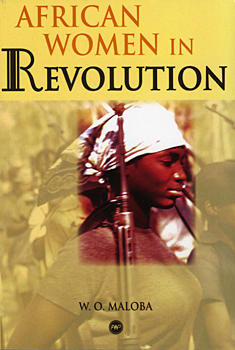The book, which covers the role of women in revolutionary struggles in Algeria, Angola, Guinea-Bissau, Kenya, Mozambique, South Africa and Zimbabwe, is an outgrowth of Maloba's first book, Mau Mau and Kenya: An Analysis of a Peasant Revolt (published by Indiana University Press in 1993 and reprinted in 1998), which did not include the important role that women played in the struggle.
“Part of it is a celebration of African women, whose image in the West is one of docile, submissive women,” Maloba said. “Contrary to that, they have been the backbone of the major events that have shaped African history. You can look at all the major events; they could not have taken place without the active participation of women, and I wanted to celebrate and recognize that.”
Maloba said the book, which is dedicated to his wife, Carol Rudisell, a librarian in UD's Morris Library, began as an essay about the Mau Mau and grew over a period of 10 years. “Every time I started work on it, I found that there were many similarities between what happened in Kenya and other revolutionary movements, so I decided to expand it.”
The contribution of women in the revolutions in the male-dominated societies took many forms, mostly support roles. For example, the estimated 10,000 women who joined Algeria's National Liberation front (FLN) were generally excluded from combat roles, but many women volunteers conducted strategic assassinations and delivered bombs. The majority of the women were peasants, and many of them provided food and shelter to militants. Women also supported the Mau Mau movement in Kenya--some of them joined the guerillas in the forests while others in villages were organizing to provide food and deliver it to the fighters.
In Zimbabwe, in addition to their critical role providing food, women also supported the revolution by making cash contributions, attending clandestine meetings and ensuring the loyalty of their families to the cause. Women in Angola helped prepare food and wash clothes, but their roles extended to combat operations following the formation of the Organization of Angolan Women (OMA), which sought to “harness the energies of women both for national liberation and their own liberation.”
The book, published by Africa World Press, also explores the negative effects of globalization on African economies, with examples from Mozambique, Senegal and Zimbabwe to show the detrimental consequences of embracing globalization on families.
“Current globalization has to be seen as the flowering of unrestrained and even abrasive neocolonialism,” Maloba wrote in the book's introduction. “This development has made it very difficult for these countries, having attained their political independence through revolutionary struggle, 'to reap the economic and social benefits of decolonization.'”
Maloba said that his choice of countries was based on the fact that almost all of them had armed revolutionary movements that fought vigorously for independence from colonial rulers. In almost all those revolutions, he said, the liberation of women was an integral part of the definition of their national liberation.

Maloba wrote that globalization, which “affirms the structure and operation of imperialism,” has promoted the exploitation of less-developed, mostly agrarian states by imperial states and multinational corporations and banks. Globalization--according to Maloba, which was preceded by similarly detrimental policies that were vigorously promoted by the World Bank and the International Monetary in the 1970s and 1980s as Structural Adjustment Programs--has undermined the progress of women in Africa by forcing them to make difficult choices, from dealing with economic insecurity to migration in search of work.
“These general effects of globalization and the Structural Adjustment Programs on women are common to almost all African countries,” Maloba wrote. “In addition, there are consequences unique to each country. And even here it is useful to mention that separate groups of women are affected differently due to factors like class, access to land, level of education and occupation, region, religion and even race in some countries.”
Maloba said that any study of the participation of women in postcolonial societies must include an understanding of the position of women in the family through an interdisciplinary approach, including history, economics, international politics and culture.
“All of these things have a bearing on what has happened to women in post-revolutionary societies. It's unrealistic to expect that you can explain the position of women in those societies in a single academic discipline,” Maloba said.
Maloba said the unique subject of the book creates opportunities for both direct and indirect comparisons of the subject. The scope, he said, will be of interest to students and faculty in women's studies, African studies and international politics, as well as people engaged in development work.
Maloba, who lives in Newark, is the founding director of the African Studies Program at UD. He joined the University in 1988 after earning his bachelor's degree at the University of Nairobi and his doctoral degree in African history from Stanford University. He has authored several articles on nationalism and decolonization.
Article by Martin Mbugua
Photo by Kathy F. Atkinson


